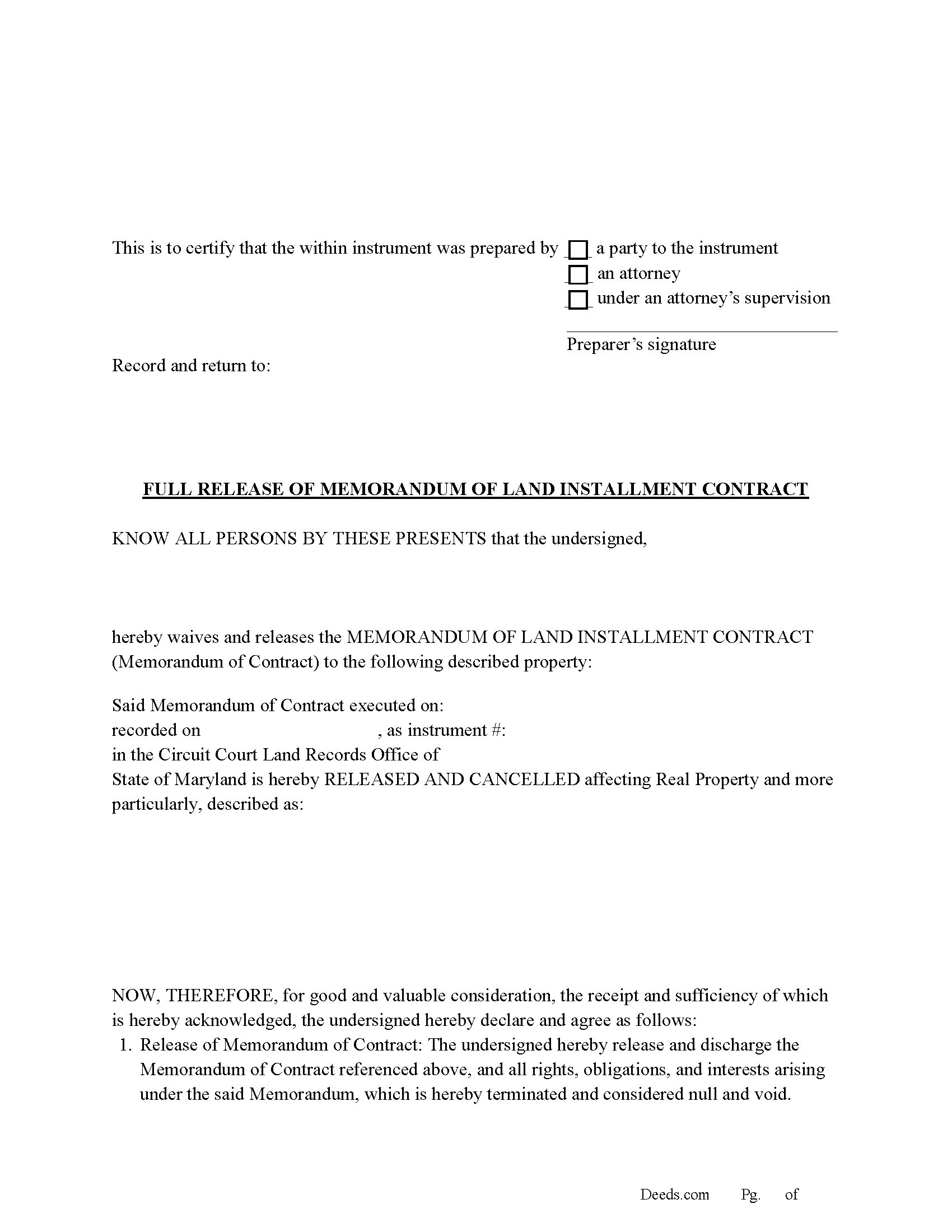Maryland Release of Memorandum of Land Installment Contract Forms
Choose Your County or Independent City
Maryland Release of Memorandum of Land Installment Contract Overview

About Maryland Release of Memorandum of Land Installment Contract Forms
Our release of memorandum of land installment contract forms are specifically formatted for each county or independent city in Maryland. This ensures your documents meet all local requirements and will be accepted for recording without delays or rejection fees.
Recording a Release of a Memorandum of Land Installment Contract has important legal and practical effects on both the seller (vendor) and the buyer (purchaser). It signifies the termination or satisfaction of the land installment contract, and by recording the release, it provides public notice that the agreement is no longer in effect. Here’s how it impacts both parties:
Impact on the Seller (Vendor):
1. Clear Title: Recording a release removes the cloud on the title created by the original land installment contract or its memorandum. This means the seller can regain full legal ownership and control of the property without the buyer's interest being an encumbrance.
Future Transactions: After the release is recorded, the seller is free to sell, transfer, or refinance the property without concern about the installment contract being on record.
2. Liability Reduction: Once the release is recorded, the seller is typically released from obligations under the land installment contract. This includes any obligations to deliver the property to the buyer, provided all terms of the contract (such as payment) have been fulfilled or the contract has been canceled or satisfied.
3. Finalizing the Transaction: If the land installment contract has been satisfied (e.g., the buyer has made all payments), recording the release formalizes the end of the seller's involvement with the property and the buyer.
Impact on the Buyer (Purchaser):
1. End of Buyer’s Interest: Once the release is recorded, the buyer no longer holds any recorded interest or claim in the property. The buyer's right to acquire the property under the terms of the installment contract is terminated or satisfied, depending on the circumstances. If the contract was canceled or defaulted upon, the buyer's claim to the property is extinguished.
If the contract was fully satisfied, the buyer may now own the property outright (in which case the deed to the property would also be recorded).
2. Public Notice: Recording the release ensures that any third parties (like lenders, creditors, or potential buyers) are aware that the buyer no longer has an interest in the property. This is important for preventing disputes or misunderstandings in future transactions involving the property.
3. Obligation Relief: Once the release is recorded, the buyer is no longer obligated to make payments under the installment contract, and their liability under the agreement ends, assuming it has been satisfied or legally terminated.
Other Considerations:
Satisfaction of the Contract: If the buyer has fully satisfied the terms of the land installment contract (typically by making all payments), the release could signify the transfer of full legal ownership to the buyer. In such cases, the release would be recorded alongside a deed conveying ownership to the buyer.
Default or Termination: If the buyer defaults on the contract or both parties agree to terminate it, the release reflects the termination of the agreement. The buyer no longer has rights to the property, and the seller can take full control or re-sell it.
Public Record: By recording the release, it becomes part of the public land records, creating a clear chain of title and ensuring that future purchasers, lenders, or interested parties know that the land installment contract is no longer in effect.
Key Sections of Maryland Law:
Maryland Real Property Code, Section 3-101: This section governs the general requirements for the recordation of documents affecting real property, including the release of memoranda or other recorded interests.
Maryland Real Property Code, Section 3-105: This section addresses the priority of recorded documents and the effect of recording a release, ensuring that future buyers or parties are aware that the land installment contract is no longer in effect.
Our forms are specifically formatted for each county or independent city to ensure acceptance.